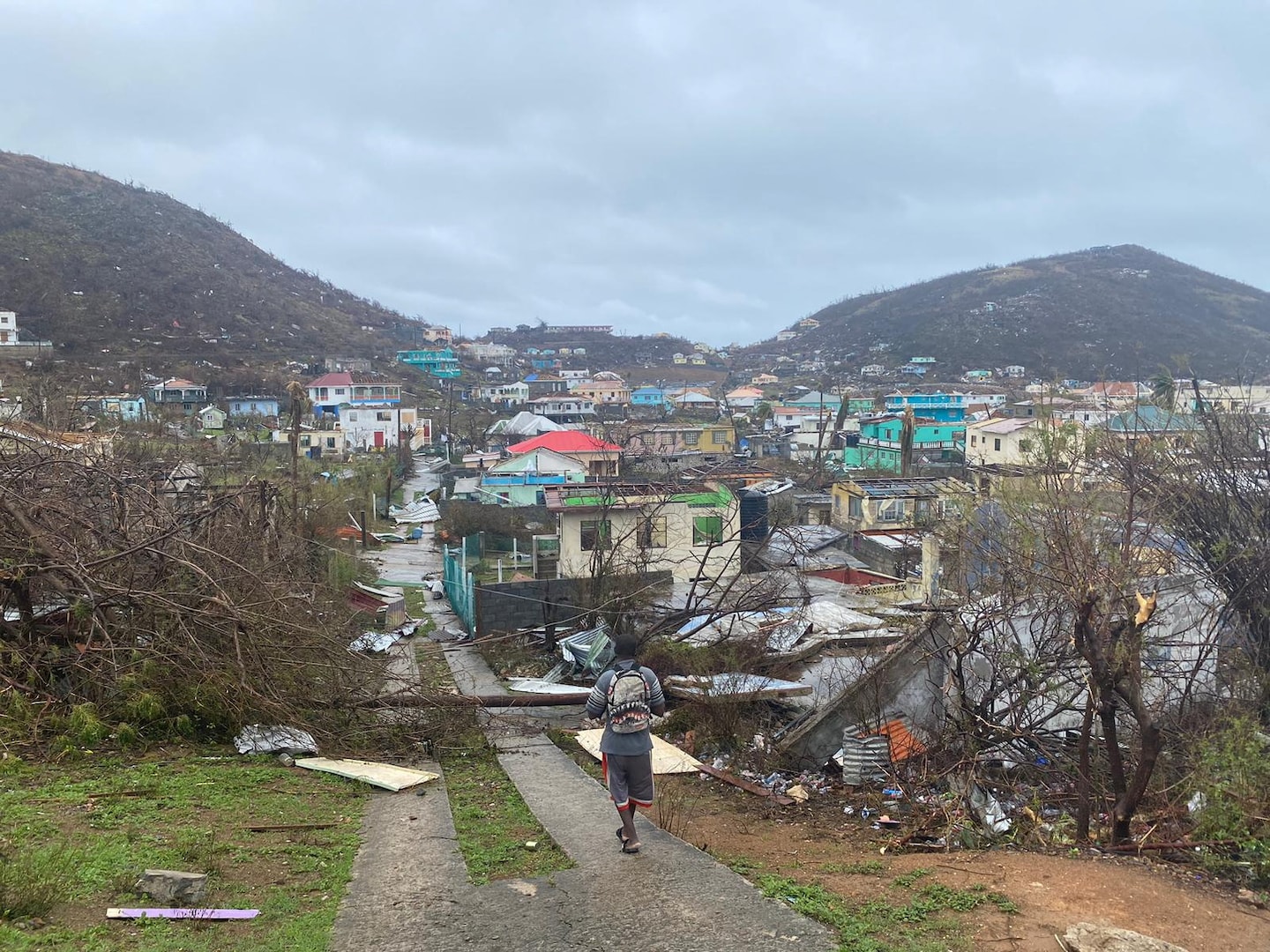Maria Ollivierre and her family huddled under a couch as Hurricane Beryl bore down on Mayreau, one of the smallest islands of St. Vincent and the Grenadines.
“We were not expecting it to be this devastating,” she said Saturday, five days after the storm. “When the wind finally calmed down and we walked out, we realized everyone’s home had been damaged or completely destroyed.”
The next day, the island — and a number of its neighbors — began a long journey toward recovery.
As Beryl moves this weekend toward the Gulf of Mexico and Texas, the Caribbean islands already hit by the storm face the task of rebuilding. With damage assessments and relief efforts underway, many residents are processing the devastation. Some of the hardest-hit areas still require basic necessities: food, water, medicine and power.
“We’re just trying to take it one step at a time,” Ollivierre said. “Deal with what we have to deal with and go forward, more or less.”
The storm — which has swept nearly 3,000 miles from the Atlantic to the Gulf of Mexico — was the first hurricane of this season. The earliest Category 5 ever recorded for the Atlantic hurricane season, its arrival jarred Caribbean leaders, who cited concerns about climate change and increased need for aid.
Officials said the public largely heeded warnings to prepare as Beryl swept toward the islands this week — and said some places were spared from what could have been a more destructive storm — but many structures were no match for the swift wind and heavy flooding. At least seven deaths have been reported across Grenada, St. Vincent and the Grenadines and Jamaica. Three have been reported in Venezuela.
The storm made landfall in Grenada on Monday, ravaging that country’s islands of Carriacou and Petite Martinique, where officials said almost 98 percent of homes and buildings were destroyed. Parts of St. Vincent and the Grenadines were also badly affected, including Union Island, where the country’s prime minister said almost all 2,500 inhabitants lost their homes.
Beryl then swirled by Jamaica on Wednesday, weakening to a Category 4 hurricane, before hitting the Yucatán Peninsula on Friday as a Category 2. Beryl was projected to reach the Texas coast late Sunday into Monday.
It had weakened to a tropical storm by Saturday morning but was projected to strengthen into a hurricane again before hitting Texas.
On Grenada, officials this week grappled with severed communications, blocked roads and limited access to fuel as they started surveying damage on Carriacou and Petite Martinique.
While power and water have been restored on the southern end of Grenada, some of the north was badly hit and still lacked the basics, said resident Bernard Wilson. The government rallied volunteers on Saturday to help clean up the island, and utility workers could be seen “working around-the-clock,” Wilson said.
Much of the damage was reminiscent of Hurricane Ivan’s aftermath in 2004, said Wilson, whose home on the island’s southern end was damaged then but was spared this time. He guessed it could take years to recover.
“We’re coping,” he said. “It was disturbing, but not unfamiliar.”
Global Empowerment Mission, a relief nonprofit organization, was among those bringing aid to Grenada. Its first shipment landed Thursday, and another, for the Grenadines, was slated to arrive in Barbados on Sunday, said Michael Capponi, the organization’s president. On Petite Martinique, his team saw buildings leveled and concrete houses left as shells.
“There’s not much remaining there,” Capponi said. “Everything’s going to have to be redone. There’s no more kitchens, there’s no more bedding, anything.”
In Jamaica, the wind ripped metal roofs off homes and damaged farms and buildings. The cleanup effort began Thursday.
Prime Minister Andrew Holness said on social media Friday that about 100 roofs had been lifted away, noting the potential economic consequences and the “human suffering, particularly for pregnant mothers and the elderly.” Though wind and rain were intense, Holness said Jamaica was “spared the worst.”
Still, the storm was “terrifying,” leaving people “grateful to be alive,” said Jason Henzell of Treasure Beach, an area in the impacted St. Elizabeth parish.
“We’re seeing a tremendous amount of roof damage, a tremendous amount of trees that are down,” said Henzell, founder of local nonprofit Breds, a community-development organization. “A lot of homes are affected, a lot of churches, a lot of schools, a lot of clinics.”
On Saturday, Henzell was working on securing a generator to power water pumping stations and coordinating with Global Empowerment Mission. His organization had a plane set to land Saturday night with supplies for the Treasure Beach area, and it was working to collect donations from American companies for roofing and other supplies for rebuilding homes, said Capponi, who was there Saturday.
With her home on Mayreau badly damaged by the storm, Ollivierre and about 10 relatives took refuge at a family member’s shop for two days — a concrete building that had weathered the storm — before catching a boat to another relative’s home on the main island of St. Vincent, which was spared the storm’s worst.
By Saturday, communications on Mayreau remained spotty, Ollivierre said, and there was no electricity.
“People don’t know how their loved ones are doing,” she said.
Ralph Gonsalves, prime minister of St. Vincent and the Grenadines, pledged that the islands would come back stronger and more resilient.
“We have a lot of cleanup to do, we have a lot of humanitarian relief,” he said in an address posted to social media Thursday. Local relief organizations, such as We Are Mayreau, worked to shelter displaced residents.
Many, like Ollivierre, have ended up on St. Vincent. A ferry service had resumed to transport residents between the main island and Union Island, Mayreau and Canouan.
Ollivierre, recovering from a foot injury she sustained during the chaos of the storm, was counting the days until she could return.
“I’m just missing home,” she said. “I just want to be home, want to be helping.”

